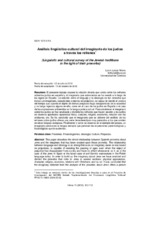Mostrar el registro sencillo del ítem
Análisis lingüístico-cultural del imaginario de los judíos a través los refranes
| dc.contributor.author | Luque Nadal, Lucía | |
| dc.date.accessioned | 2020-01-23T09:14:56Z | |
| dc.date.available | 2020-01-23T09:14:56Z | |
| dc.date.issued | 2012 | |
| dc.identifier.issn | 1579-9794 | |
| dc.identifier.uri | http://hdl.handle.net/10396/19363 | |
| dc.description.abstract | This paper describes the direct relationship between Spanish proverbs about Jews and the imaginary that has been created upon these proverbs. The relationship between language and ideology is so strong that even an imaginary, more or less based on prejudices, is capable of resisting the passing of ages even when the object of prejudice has disappeared from society and have no effect whatsoever on it, as in the case of the Jews in Spain or the latest case of anti-Semitic expressions in the Polish language today. In order to build up the imaginary about Jews we have analized and divided the proverbs that refer to Jews in several sections: physical appearance, character, religion, economy, relations with Christians, and so on. It was concluded that the imaginary obtained from the analysis of the proverbs about Jews offers a picture This paper describes the direct relationship between Spanish proverbs about Jews and the imaginary that has been created upon these proverbs. The relationship between language and ideology is so strong that even an imaginary, more or less based on prejudices, is capable of resisting the passing of ages even when the object of prejudice has disappeared from society and have no effect whatsoever on it, as in the case of the Jews in Spain or the latest case of anti-Semitic expressions in the Polish language today. In order to build up the imaginary about Jews we have analized and divided the proverbs that refer to Jews in several sections: physical appearance, character, religion, economy, relations with Christians, and so on. It was concluded that the imaginary obtained from the analysis of the proverbs about Jews offers a picture. | es_ES |
| dc.description.abstract | El presente trabajo expone la relación directa que existe entre los refranes sobre los judíos en español y el imaginario que sobre estos se ha creado a lo largo de los siglos en España. La relación entre el lenguaje y la ideología es tan estrecha que incluso un imaginario, basado más o menos en prejuicios, es capaz de resistir el avance del tiempo aun cuando el objeto de dichos prejuicios haya desaparecido de la sociedad y no tenga vigencia alguna en ella, como en el caso de los judíos en España o el caso de las expresiones antisemitas en la lengua polaca actual. Para establecer el imaginario sobre los judíos se han analizado y dividido los refranes que hacen alusión a los judíos en diversos apartados: apariencia física, carácter, religión, economía, relación con los cristianos, etc. Se ha concluido que el imaginario que se obtiene del análisis de los refranes sobre judíos ofrece una serie de estereotipos muy parecidos a los que existen en otras lenguas europeas. Finalmente y como se observa en el ejemplo del polaco, un imaginario pervive en la lengua siempre que pervivan las expresiones paremiológicas y fraseológicas que lo sustentan. | es_ES |
| dc.format.mimetype | application/pdf | es_ES |
| dc.language.iso | spa | es_ES |
| dc.publisher | UCOPress | es_ES |
| dc.rights | https://creativecommons.org/licenses/by-nc-nd/4.0/ | es_ES |
| dc.source | Hikma 11, 103-112 (2012) | es_ES |
| dc.subject | Paremias | es_ES |
| dc.subject | Fraseologismos | es_ES |
| dc.subject | Ideología | es_ES |
| dc.subject | Cultura | es_ES |
| dc.subject | Prejuicios | es_ES |
| dc.subject | Proverbs | es_ES |
| dc.subject | Idioms | es_ES |
| dc.subject | Ideology | es_ES |
| dc.subject | Culture | es_ES |
| dc.subject | Prejudices | es_ES |
| dc.title | Análisis lingüístico-cultural del imaginario de los judíos a través los refranes | es_ES |
| dc.title.alternative | Linguistic and cultural survey of the Jewish traditions in the light of their proverbs | es_ES |
| dc.type | info:eu-repo/semantics/article | es_ES |
| dc.relation.publisherversion | https://www.uco.es/ucopress/ojs/index.php/hikma/index | es_ES |
| dc.rights.accessRights | info:eu-repo/semantics/openAccess | es_ES |

